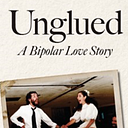How Al-Anon’s Three C’s Helped Me Navigate My Wife’s Bipolar Disorder
The best reminder I ever heard with regard to loving my wife who’s living with bipolar disorder came from a pal of mine I call Jack Lemmon.
“In Al-Anon,” Jack Lemmon said, “they talk about the Three C’s: I didn’t cause my wife’s drinking, I can’t control it, and I can’t cure it.”
The real Jack Lemmon was an actor you might have seen in a few thousand old movies. In Some Like It Hot, he was the bass player dressed in drag swooning over Marilyn Monroe. In the Odd Couple he played the uptight divorcee Felix Unger; in Missing, the distraught Christian Scientist father of a kidnapping victim in Chile; and in Glengarry Glen Ross, Shelley Levene, the washed-up real estate salesman.
I met my Jack Lemmon not at an Al-Anon meeting but in a support group for spouses and partners of those living with a mental illness. Like the actor’s characters, my pal Jack Lemmon is earnest and sad and religious and funny and relentless in how much of a hard time he gives me, which I return in kind, the start of a beautiful friendship among two grumpy old men maintaining our sanity and our hope while caring for wives battling mood disorders.
Jack’s wife has been sober for more than a year, which is a blessing. But she’s got severe anxiety and depression, the kind that keeps a person glued to the couch day after day, month after month, thirty-plus years in all, the kind of mental illness that leaves a spouse wondering where he went right and what went wrong, for that is love, as mysterious as pulsars and dark matter and the multiverse, or, closer to home, how a guy like me with three college degrees can’t remember to pull up his fly after visiting the commode.
When my wife was severely depressed, Jack tried cheering me up, calling his wife’s mental illness a gift. “It’s made me a better person,” Jack said, to which I responded, “It’s the gift that keeps on giving.”
In truth, I have become a better person since my wife became ill, and I thank her doctors, the evil drug companies, and God Almighty for my wife’s improved health the past year, which is unfair to Jack, because he prays more often than I do and is currently a lot worse off. One day he lost all hope and I said, “Jack, even if you lose hope in your wife, you can’t lose hope in yourself.”
I reminded Jack we didn’t cause our wives to get sick. It might have been childhood trauma, or career loss, or scrambled brain chemistry, or who knows what led to their illnesses. We’re imperfectly loving husbands, not biochemists or psychics, and we best not get sucked into the cyclone of figuring out how the mind operates. If I were that smart I’d start with my own messy brain and figure out the fourth C, catastrophizing, which I am prone to do the moment I turn on the news or await the results of my annual cholesterol test.
We can’t control our spouses’ health or how well they control their health. That sounds exasperating, but to me it’s liberating. I never stop caring about my wife or encouraging her to care for herself. But she’s a grown woman, smarter than I am, and if there’s one thing the seven billion books about highly successful relationships have in common, it’s that you should figure out what you can control and quit forcing your self-perceived wisdom on the things and people you can’t.
We can’t cure our loved ones’ illnesses. That drives a lot of spouses bonkers, particularly the problem solvers: the IT guys, the corporate kahunas, the fixers, the kids who in eighth grade looked forward to solving word problems in algebra class: A southbound train is going sixty miles an hour. Ronald Reagan would have turned 100 years old on a Tuesday. If a bus driver has a heart attack, how will Mary’s sister pay the rent?
I hated solving word problems and can’t fix my lousy tennis backhand, let alone cure my wife’s mental health problems.
And, on days when our marriages are covered under a blanket of clouds, the more my pal Jack Lemmon and I remember Al-Anon’s Three C’s, the healthier we all are.
